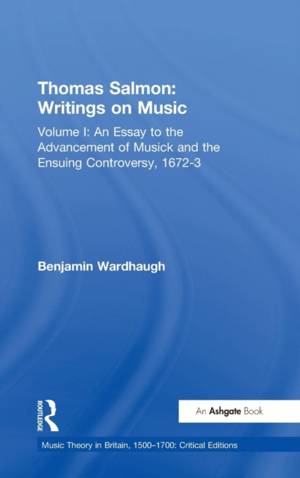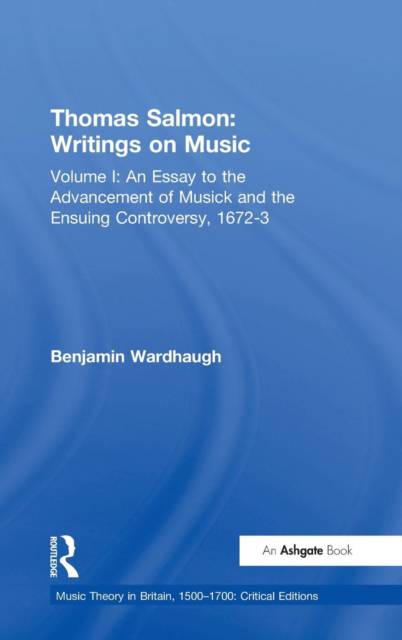
- Afhalen na 1 uur in een winkel met voorraad
- Gratis thuislevering in België vanaf € 30
- Ruim aanbod met 7 miljoen producten
- Afhalen na 1 uur in een winkel met voorraad
- Gratis thuislevering in België vanaf € 30
- Ruim aanbod met 7 miljoen producten
Zoeken
Thomas Salmon: Writings on Music
Volume I: An Essay to the Advancement of Musick and the Ensuing Controversy, 1672-3
Benjamin Wardhaugh
€ 183,45
+ 366 punten
Uitvoering
Omschrijving
Thomas Salmon (1647-1706) is remembered today for the fury with which Matthew Locke greeted his first foray into musical writing, the Essay to the Advancement of Musick (1672), and the near-farcical level to which the subsequent pamphlet dispute quickly descended. Salmon proposed a radical reform of musical notation, involving a new set of clefs which he claimed, and Locke denied, would make learning and performing music much easier. The incident has tended to be passed over rather briefly in the scholarly literature, but beneath the unedifying invective employed by Salmon, Locke and their supporters, serious and novel statements were being made about what constituted musical knowledge and what was the proper way to acquire it. This volume is the first published scholarly edition of Salmon's writings on notation, previously available only in microfilm and online facsimiles. A second volume to follow will present Salmon's writings on pitch - previously only available mostly in manuscript.
Specificaties
Betrokkenen
- Auteur(s):
- Uitgeverij:
Inhoud
- Aantal bladzijden:
- 290
- Taal:
- Engels
- Reeks:
Eigenschappen
- Productcode (EAN):
- 9780754668442
- Verschijningsdatum:
- 13/08/2013
- Uitvoering:
- Hardcover
- Formaat:
- Genaaid
- Afmetingen:
- 156 mm x 234 mm
- Gewicht:
- 585 g

Alleen bij Standaard Boekhandel
+ 366 punten op je klantenkaart van Standaard Boekhandel
Beoordelingen
We publiceren alleen reviews die voldoen aan de voorwaarden voor reviews. Bekijk onze voorwaarden voor reviews.











